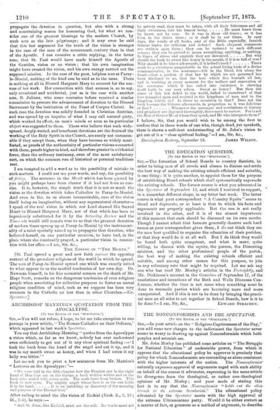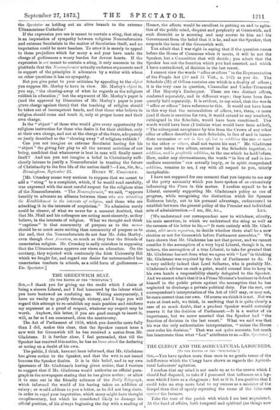THE NONCONFORMISTS AND THE SPECTATOR. [To THE EDITOR OF THE
"SPECTATOR.") SIR,—In your article on the "Religious Captiousness of the Day,". you add some new charges to the indictment the Spectator never seems to weary in drawing up against Nonconformists which both• perplex and astonish me.
Mr. John Morley has published some articles on " The Struggle- for National Education" of undeniable power, from which it appears that the educational policy he approves is precisely that policy for which Nonconformists are contending as alone consistent
with the higher interests of the nation. The Nonconformist' naturally expresses approval of arguments urged with such ability on behalf of the course it advocates, expressing in the same article- its divergence from the theological, or rather non-theological opinions of Mr. Morley ; and your mode of stating this fact is to say that the Nonconformist "holds out the olive- branch to the extreme Secularists." The educational policy advocated by the Spectator meets with the high approval of the extreme Ultramontane party. Would it be either correct as a matter of fact, or generous as a method of argument, to describe: the Spectator as holding out an olive branch to the extreme Ultramontane Catholics ?
If the expression you use is meant to contain a sting, that sting is an imputation of sympathy between religious Nonconformists and extreme Secularists in the matter of Secularism itself, and no imputation could be more baseless. To utter it is merely to appeal to those prejudices which for many a sad year have made the -charge of godlessness a weary burden for devout hearts. If the -expression is not meant to contain a sting, it only amounts to the platitude that the Nonconformist actually endorses arguments used 'in support of the principles it advocates by a writer with whom on other questions it has no sympathy.
But you give point to your criticism by appealing to the object you suppose Mr. Morley to have in view. Mr. Morley's object is, you say, " the clearing-away of what he regards as the religious rubbish in education ;" but the argument of Mr. Morley's paper is (and the approval by Dissenters of Mr. Morley's paper is your grave charge against them) that the teaching of religion should be taken out of incompetent hands, and that those who believe in 'religion should come and teach it, only at proper hours and their own charge.
Is the " object " of those who would give every opportunity for religious instruction for those who desire it for their children, only at their own charge, and not at the charge of the State, adequately mr justly described as the "clearing away" of religious rubbish ?
Can you not imagine an extreme Secularist having for his " object " the giving fair play to all the natural activities of our 'being, confident that whatsoever is best in man will finally assert itself ? And can you not imagine a belief in Christianity suffi- ciently intense to justify a Nonconformist in trusting the future
[Mr. Crosskey seems very anxious to suppose that we meant to add a " sting" to a complaint, which, if he would read carefully, -was expressed with the most careful respect for the religious aims of the Nonconformists. "The Nonconformist," we said, "appears -heartily to advocate an alliance between those who are attacking the Establishment in the interests of religion, and those who are attacking it in the interests of scepticism." No admission surely -could be clearer, of what we never for a moment doubted, that that Mr. Miall and his colleagues are acting most sincerely, as they believe, in the interests of religion. What we thought and think " captious" is that community of purpose as to the means should be so much more uniting than community of purpose as to the end, that the Nonconformists do not fear _Air. John Morley, even though dona ferentem, so much as they fear the friends of unsectarian religion. Mr. Crosskey is sadly mistaken in supposing that the Ultramontanes approve our views on education. On the -contrary, they rejected with contumely the Irish University Bill which we fought for, and regard our desire for untrammelled but • unsectarian teachers in schools, as a mild form of godlessness.— En. Spectator.]



































 Previous page
Previous page